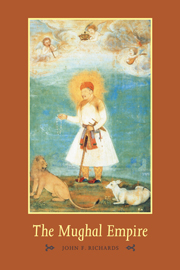Book contents
- Frontmatter
- Contents
- List of maps and tables
- General editor's preface
- Preface
- Introduction
- 1 Conquest and stability
- 2 The new empire
- 3 Autocratic centralism
- 4 Land revenue and rural society
- 5 Jahangir 1605–1627
- 6 Shah Jahan 1628–1658
- 7 The War of Succession
- 8 Imperial expansion under Aurangzeb 1658–1689
- 9 The economy, societal change, and international trade
- 10 Maratha insurgency and Mughal conquest in the Deccan
- 11 The Deccan Wars
- 12 Imperial decline and collapse, 1707–1720
- Conclusion
- Glossary
- Bibliographic essay
- Index
- THE NEW CAMBRIDGE HISTORY OF INDIA
9 - The economy, societal change, and international trade
Published online by Cambridge University Press: 28 March 2012
- Frontmatter
- Contents
- List of maps and tables
- General editor's preface
- Preface
- Introduction
- 1 Conquest and stability
- 2 The new empire
- 3 Autocratic centralism
- 4 Land revenue and rural society
- 5 Jahangir 1605–1627
- 6 Shah Jahan 1628–1658
- 7 The War of Succession
- 8 Imperial expansion under Aurangzeb 1658–1689
- 9 The economy, societal change, and international trade
- 10 Maratha insurgency and Mughal conquest in the Deccan
- 11 The Deccan Wars
- 12 Imperial decline and collapse, 1707–1720
- Conclusion
- Glossary
- Bibliographic essay
- Index
- THE NEW CAMBRIDGE HISTORY OF INDIA
Summary
Aurangzeb's Deccan victories depended as much upon Timurid wealth as his generalship and military skills. After more than a century of conquest and territorial expansion the Mughal emperor possessed enormous resources. From Akbar's annexation of Malwa in 1561 till the fall of Golconda in 1687, every victory generated large amounts of plundered treasure from the hoards of defeated rulers – often sufficient to repay the costs of conquest. Ordinary revenues obtained through taxes on agricultural production and trade poured into the emperor's coffers. In 1689 Aurangzeb had no reason to anticipate revenue shortfalls. Whether for war or for routine costs of administration the empire was self-financing from its own resources.
If a deficit year were to occur the central treasury guarded an enormous hoard of coined and uncoined gold and silver. Millions of rupees in liquid wealth held by several hundred Mughal nobles and higher-ranking mansabdars must also be viewed as a supplementary reserve. Unlike contemporary early modern European kings, the Mughal emperors did not depend upon loans from private financiers to meet routine expenditures or to pay for even the most expensive military campaigns. Military commanders on campaign who needed funds often were authorized to collect large sums from the ordinary holdings of provincial treasuries.
THE REVENUE SYSTEM
At the heart of Mughal finance was the revenue system which taxed agricultural production and urban trade.
Keywords
- Type
- Chapter
- Information
- The Mughal Empire , pp. 185 - 204Publisher: Cambridge University PressPrint publication year: 1993



